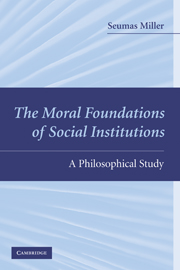2 - The Moral Foundations of Institutions
Published online by Cambridge University Press: 05 June 2012
Summary
THE VARIETIES OF SOCIAL INSTITUTION
Self-evidently, social institutions have a multifaceted normative dimension, including a moral dimension. Moral categories that are deeply implicated in social institutions include human rights and duties, contract- based rights and obligations, and rights and duties derived from the production and consumption of collective goods.
Collective goods of the kind under discussion have – as stated in the Introduction – three properties: (1) they are produced, maintained, or renewed by means of the joint activity of members of organizations or systems of organizations, that is, by institutional actors, (2) they are available to the whole community, and (3) they ought to be produced (or maintained or renewed) and made available to the whole community because they are desirable goods and ones to which the members of the community have an (institutional) joint moral right.
Such goods are ones that are desirable in the sense that they ought to be desired (objectively speaking), as opposed to simply being desired; moreover, they are either intrinsic goods (good in themselves) or the means to intrinsic goods. They include, but are not restricted to, goods in respect of which there is an institutionally prior moral right, such as security.
Roughly speaking, on my account, aggregated needs-based rights, aggregated non-needs-based human rights, and other desirable goods generate collective moral responsibilities that provide the ethico-normative basis for institutions, for example, business organizations in competitive markets, welfare institutions, police organizations, and universities, which fulfill those rights (see Section 3).
- Type
- Chapter
- Information
- The Moral Foundations of Social InstitutionsA Philosophical Study, pp. 56 - 90Publisher: Cambridge University PressPrint publication year: 2009



